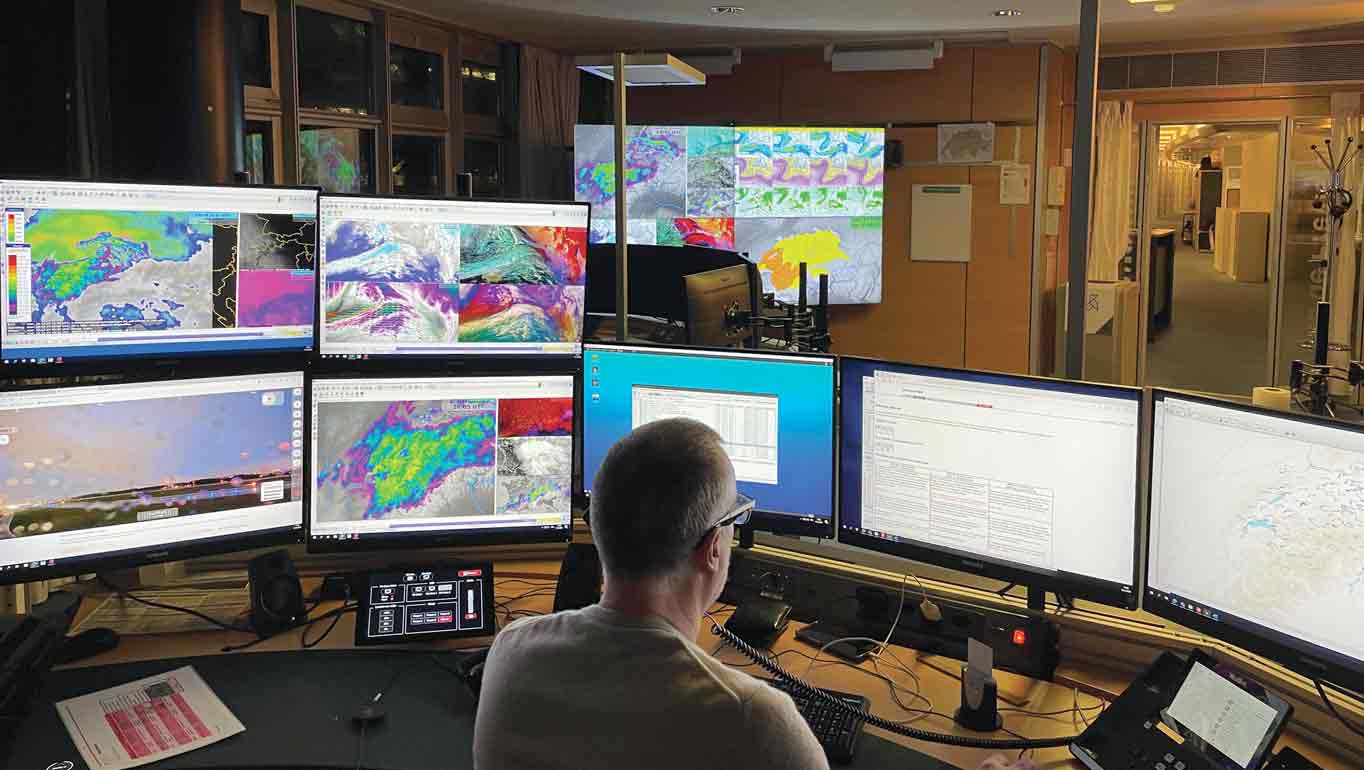MeteoSwiss is the Federal Office for Meteorology and Climatology. As Switzerland’s national weather and climate service, MeteoSwiss has been playing an important role in the country’s safety and prosperity for almost 160 years, providing the basis for decision-making for science, politics and society.
Dr Isabelle Bey, leader of the MeteoSwiss Regional Center in Geneva, offers her thoughts on how WMO intends to cement this reputation.
The general public and various industries and science communities benefit from the range of services provided by a team of around 390 employees working in Zurich, Geneva, Payerne and Locarno.
Dr Isabelle Bey began her career in her home country, France, with Masters degrees both in atmospheric chemistry and materials and process engineering at the University of Grenoble and Institut National Polytechnique de Grenoble, respectively. Four years later, she completed her PhD in atmospheric chemistry at the University of Paris-XII. She continued her career abroad with a postdoctoral position at Harvard University in the US. While there, she was part of the team which developed a widely used computer model to simulate the composition of the atmosphere, focusing on the chemical compounds which are relevant for both air quality and climate.
Dr Bey first came to Switzerland in 2001 as an Assistant Professor of Atmospheric Chemistry at École Polytechnique Fédérale de Lausanne (EPFL). She then worked for seven years as Executive Director of the Center for Climate System Modeling (C2SM) at Eidgenössische Technische Hochschule (ETH) Zurich. Since May 2016, she has been leading the MeteoSwiss Regional Center in Geneva.
When asked about the interactions between MeteoSwiss and WMO in the realms of public safety and emergency preparedness, Dr Bey replied, “Switzerland is a member of WMO, and MeteoSwiss staff members contribute to several WMO working groups and programs relating to all aspects of meteorology. For example, since 2021, MeteoSwiss has made significant contributions to the WMO Coordination Mechanism, which aims to curate meteorological information from members to better inform humanitarian agencies about the potential impact of weather and climate on their operations and development.”
Due to the omnipresence of weather, which plays a large role in many industries, MeteoSwiss naturally impacts a multitude of sectors.
Dr Bey outlined a few examples below:
• Allergies: In 2023, MeteoSwiss deployed the world’s first automatic pollen measurement network, giving us almost real-time data about the pollen concentration in the air. It used to take nearly a week to produce this information.
• Chemical/nuclear accident: MeteoSwiss operates a wind analysis and forecasting system for nuclear accidents in Switzerland and neighboring countries. It combines a special measurement network and a numerical weather model to provide important bases for emergency response in Switzerland. These can also be used for major events involving the spread of non-radioactive atmospheric pollutants.
• Climate scenarios: MeteoSwiss follows the IPCC cycle and develops regional nationwide climate scenarios for stakeholders such as members of the research community, practitioners and decision-makers.
The recent and ongoing prevalence of AI has impacted many professions. When asked about the domain of meteorology, Dr Bey said that: “AI has already influenced the domain of meteorology to some extent, but this will change in an unprecedented manner in the coming years. MeteoSwiss has been using AI for some time in the realm of measurements (for example, pollen, data quality control) and postprocessing (for example, of wind). A working group dedicated to AI has been created within the office to develop synergies among the staff members and develop the technology in connection with AI.”
MeteoSwiss uses technology, like many companies, to connect with an online audience and provide useful information. The mobile app is used by thousands daily, as is the website. Dr Bey puts the success down to the fact that “it provides answers to common questions, such as ‘how should I dress to go hiking in the mountains?’ Many people in Switzerland enjoy outdoor activities that are weather-dependent, like hiking, skiing, mountaineering and sailing. I think people like the MeteoSwiss app and website because they provide a lot of information with just a few clicks. The MeteoSwiss app has approximately 400,000 users per day, and during weather alerts the number rises to almost a million.”
Dr Bey concludes our interview with an anecdote from her first day, when “there was a big electrical failure in the WMO building and in the surrounding neighborhood. The person who was supposed to lead me through my first day was stuck in an elevator at home. When I arrived, nobody had time for me, and I saw a group of people running around and doing their best to solve the problems to make sure that we could, despite the electrical failure, provide our services with the best possible quality. I was really impressed. Since then, we have significantly improved our business continuity management system, but the dedication and engagement of our staff members certainly remain and are a testament to their passion.”



